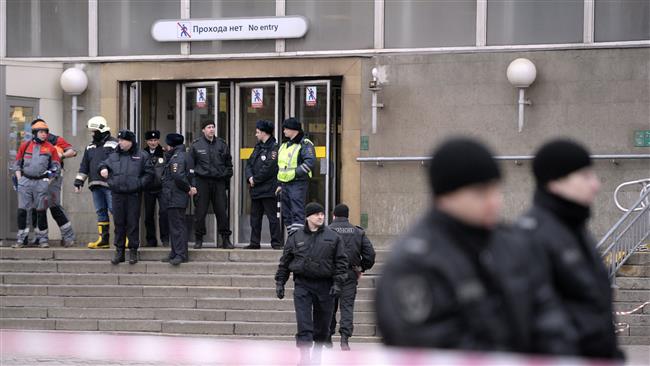Terrorists use Telegram to plot attacks: Russia's security agency
Russia's FSB security service says terrorists have been using the Telegram messaging app to plot terror attacks on Russian soil, days after the authorities accused the company of violating the country’s legislation.
On Monday, the FSB, the successor to the Soviet-era KGB, released a statement, which said Telegram provided "terrorists with the opportunity to create secret chat rooms with a high degree of encryption."
The FSB said the terrorist who carried out the April bomb attack at the Saint Petersburg metro had used Telegram to plot the operation with his accomplices.
At least 15 people were killed in the Saint Petersburg metro bomb attack on April 3.
The statement noted that Telegram had become the most widely used app of its kind by terrorists operating on Russian soil.
Reacting on the social media, Telegram founder Pavel Durov wrote on Monday that the Russia’s communications regulator had also urged his company to hand over the keys to the security services so they could decrypt user messages in order to find the terrorists.
Durov argued that the request ran counter to the constitutional right to keep correspondence confidential and was also technically impossible.
The founder of Telegram noted that if Russia banned Telegram, terrorists would simply switch to its competitors, which also offered end-to-end encryption.
"If you want to defeat terrorism by blocking stuff, you'll have to block the Internet," Durov pointed out.

The new pressures on Telegram comes after Russia's communications regulator Roskomnadzor said on Friday it would block Telegram if it refused to provide information about the company which controls Telegram, noting that the firm has so far refused to do so.
Estimates suggest that thousands of Russian nationals have joined the militant groups in Syria since the war began in the Arab country six years ago.
In September 2015, Russia started a military campaign in Syria at the official request of the government in Damascus.
Besides helping Damascus with the anti-terror campaign, Russia has defended its military presence in Syria as a preemptive measure aimed at preventing possible terror attacks on its soil when militants return home.
On Friday, the head of Russia’s Anti-Terrorist Center (ATC) warned that the Daesh Takfiri terror group was seeking to shift the main focus of its acts of terrorism from Iraq and Syria, where it is suffering fatal blows, to Central Asia.
He said Daesh sought to subdue some Taliban militants and other local extremist groups to create a new power base in Afghanistan and extend its influence to Central Asia.
Read more:
'Next to impossible' to rescue patients from Gaza's Kamal Adwan Hospital: Director
VIDEO | Vietnam current prosperity
Report blames gasoil exports for shortage at Iranian power plants
VIDEO | Hind Rajab Foundation names Israeli war criminals vacationing after Gaza genocide
VIDEO | Australians rally for Gaza ahead of Christmas festivities
VIDEO | Attacks on Sana'a
Iran reports further drop in annual inflation rate in December
Israel indicts two settlers over suspected spying for Hezbollah












 This makes it easy to access the Press TV website
This makes it easy to access the Press TV website